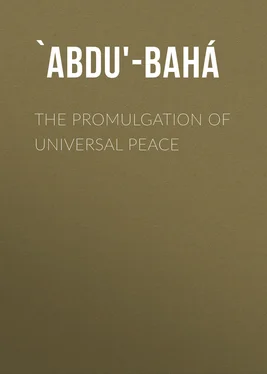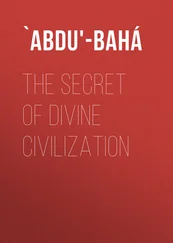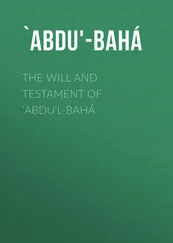`Abdu'-Bahá - The Promulgation of Universal Peace
Здесь есть возможность читать онлайн «`Abdu'-Bahá - The Promulgation of Universal Peace» — ознакомительный отрывок электронной книги совершенно бесплатно, а после прочтения отрывка купить полную версию. В некоторых случаях можно слушать аудио, скачать через торрент в формате fb2 и присутствует краткое содержание. Издательство: Иностранный паблик, Жанр: foreign_prose, foreign_religion, Философия, Ужасы и Мистика, foreign_psychology, на английском языке. Описание произведения, (предисловие) а так же отзывы посетителей доступны на портале библиотеки ЛибКат.
- Название:The Promulgation of Universal Peace
- Автор:
- Издательство:Иностранный паблик
- Жанр:
- Год:неизвестен
- ISBN:нет данных
- Рейтинг книги:4 / 5. Голосов: 1
-
Избранное:Добавить в избранное
- Отзывы:
-
Ваша оценка:
- 80
- 1
- 2
- 3
- 4
- 5
The Promulgation of Universal Peace: краткое содержание, описание и аннотация
Предлагаем к чтению аннотацию, описание, краткое содержание или предисловие (зависит от того, что написал сам автор книги «The Promulgation of Universal Peace»). Если вы не нашли необходимую информацию о книге — напишите в комментариях, мы постараемся отыскать её.
The Promulgation of Universal Peace — читать онлайн ознакомительный отрывок
Ниже представлен текст книги, разбитый по страницам. Система сохранения места последней прочитанной страницы, позволяет с удобством читать онлайн бесплатно книгу «The Promulgation of Universal Peace», без необходимости каждый раз заново искать на чём Вы остановились. Поставьте закладку, и сможете в любой момент перейти на страницу, на которой закончили чтение.
Интервал:
Закладка:
Praise be to God! The Sun of Reality has dawned, and its effulgences are shining from all horizons. The signs of God are resplendent, and the teachings of the heavenly Messengers are being spread. May the hearts be directed to the Kingdom of God and become illuminated by witnessing the lights of God in order that all created beings may obtain a portion of the divine bestowals. May the spirit of life be restored through the divine graces of the Almighty, and may the East and West be bound together. May oneness and harmony become manifest in all regions. May the people of the world become as one family and obtain the everlasting bounty. May the doors of the Kingdom be opened from all directions and the praise of the name Abhá be heard throughout the earth.
TALK ‘ABDU’L-BAHÁ DELIVERED IN PITTSBURGH
7 May 1912
Talk at Hotel Schenley
Pittsburgh, Pennsylvania
I have come from the Orient to visit your country. Surely this continent is praiseworthy from all points of view, and there are signs of prosperity everywhere. The people show refinement, and evidences of progressive civilization abound. I will give you a brief exposition of the fundamental principles of Bahá’u’lláh’s teachings in order that you may be informed of the nature and significance of the Bahá’í movement.
About sixty years ago the greatest enmity and strife existed among the various peoples and religious denominations of Persia. Throughout the world generally war and dissension prevailed. At this time Bahá’u’lláh appeared in Persia and began devoting Himself to the uplift and education of the people. He united divergent sects and creeds, removed religious, racial, patriotic and political prejudices and established a strong bond of unity and reconciliation among varying degrees and classes of mankind. The enmity then existing among the people was so bitter and intense that even ordinary association was out of the question. They would not meet and consult with each other at all. Through the power of the teachings of Bahá’u’lláh the most wonderful results were witnessed. He removed the prejudices and hatred from human hearts and wrought such transformation in their attitudes toward each other that today in Persia there is perfect accord among hitherto bigoted religionists, varying sects and divergent classes. This was not an easy accomplishment, for Bahá’u’lláh underwent severe trials, great difficulties and violent persecution. He was imprisoned, tortures were inflicted upon Him, and finally He was banished from His native land. He bore every ordeal and infliction cheerfully. In His successive exiles from country to country up to the time of His ascension from this world, He was enabled to promulgate His teachings, even from prison. Wherever His oppressors sent Him, He hoisted the standard of the oneness of the world of humanity and promulgated the principles of the unity of mankind. Some of these principles are as follows. First, it is incumbent upon all mankind to investigate truth. If such investigation be made, all should agree and be united, for truth or reality is not multiple; it is not divisible. The different religions have one truth underlying them; therefore, their reality is one.
Each of the divine religions embodies two kinds of ordinances. The first is those which concern spiritual susceptibilities, the development of moral principles and the quickening of the conscience of man. These are essential or fundamental, one and the same in all religions, changeless and eternal—reality not subject to transformation. Abraham heralded this reality, Moses promulgated it, and Jesus Christ established it in the world of mankind. All the divine Prophets and Messengers were the instruments and channels of this same eternal, essential truth.
The second kind of ordinances in the divine religions is those which relate to the material affairs of humankind. These are the material or accidental laws which are subject to change in each day of manifestation, according to exigencies of the time, conditions and differing capacities of humanity. For instance, in the day of Moses ten commandments in regard to murder were revealed by Him. These commandments were in accordance with the requirements of that day and time. Other laws embodying drastic punishments were enacted by Moses—an eye for an eye, a tooth for a tooth. The penalty for theft was amputation of the hand. These laws and penalties were applicable to the degree of the Israelitish people of that period, who dwelt in the wilderness and desert under conditions where severity was necessary and justifiable. But in the time of Jesus Christ this kind of law was not expedient; therefore, Christ abrogated and superseded the commands of Moses.
In brief, every one of the divine religions contains essential ordinances, which are not subject to change, and material ordinances, which are abrogated according to the exigencies of time. But the people of the world have forsaken the divine teachings and followed forms and imitations of the truth. Inasmuch as these human interpretations and superstitions differ, dissensions and bigotry have arisen, and strife and warfare have prevailed. By investigating the truth or foundation of reality underlying their own and other beliefs, all would be united and agreed, for this reality is one; it is not multiple and not divisible.
The second principle or teaching of Bahá’u’lláh is the proclamation of the oneness of the world of humanity—that all are servants of God and belong to one family; that God has created all and, therefore, His bestowals are universal; and that His providence, training, sustenance and loving-kindness surround all mankind.
This is the divine policy, and it is impossible for man to lay the foundation of a better plan and policy than that which God has instituted. Therefore, we must recognize and assist the purpose of the glorious Lord. Inasmuch as God is kind and loving to all, why should we be unkind? As this human world is one household, why should its members be occupied with animosity and contention? Therefore, humanity must be looked upon with the eye of equal estimate and in the same attitude of love. The noblest of men is he who serves humankind, and he is nearest the threshold of God who is the least of His servants. The glory and majesty of man are dependent upon his servitude to his fellow creatures and not upon the exercise of hostility and hatred.
The third principle or teaching of Bahá’u’lláh is the oneness of religion and science. Any religious belief which is not conformable with scientific proof and investigation is superstition, for true science is reason and reality, and religion is essentially reality and pure reason; therefore, the two must correspond. Religious teaching which is at variance with science and reason is human invention and imagination unworthy of acceptance, for the antithesis and opposite of knowledge is superstition born of the ignorance of man. If we say religion is opposed to science, we lack knowledge of either true science or true religion, for both are founded upon the premises and conclusions of reason, and both must bear its test.
The fourth principle or teaching of Bahá’u’lláh is the readjustment and equalization of the economic standards of mankind. This deals with the question of human livelihood. It is evident that under present systems and conditions of government the poor are subject to the greatest need and distress while others more fortunate live in luxury and plenty far beyond their actual necessities. This inequality of portion and privilege is one of the deep and vital problems of human society. That there is need of an equalization and apportionment by which all may possess the comforts and privileges of life is evident. The remedy must be legislative readjustment of conditions. The rich too must be merciful to the poor, contributing from willing hearts to their needs without being forced or compelled to do so. The composure of the world will be assured by the establishment of this principle in the religious life of mankind.
Читать дальшеИнтервал:
Закладка:
Похожие книги на «The Promulgation of Universal Peace»
Представляем Вашему вниманию похожие книги на «The Promulgation of Universal Peace» списком для выбора. Мы отобрали схожую по названию и смыслу литературу в надежде предоставить читателям больше вариантов отыскать новые, интересные, ещё непрочитанные произведения.
Обсуждение, отзывы о книге «The Promulgation of Universal Peace» и просто собственные мнения читателей. Оставьте ваши комментарии, напишите, что Вы думаете о произведении, его смысле или главных героях. Укажите что конкретно понравилось, а что нет, и почему Вы так считаете.












